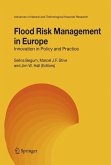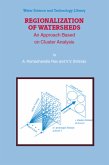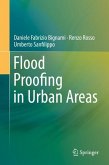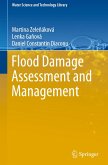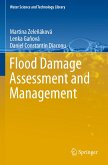In recent years major floods have occurred across Europe causing serious damages and huge financial implications. Flood risk and vulnerability is increasing with increased frequency of occurrence of extreme events due to climate change, changes in land-use, encroachment into floodplains and increasing economic value of assets and businesses. Human lives, property, environment and socio-economics are at increasing risk due to flooding. Recent alarming events in Central Europe, UK and The Netherlands have provided renewed impetus to the development of improved policies and techniques for flood risk management across Europe. Sharing of knowledge and understanding of the practical problems, dilemmas and challenges will aid in the development and implementation of new technologies and strategies of the challenging issues of flood risk management in Europe.
This valuable edition brings together 26 peer reviewed articles on technical, socio-economic, environmental and policy aspects of flood risk management. These articles contribute to the five sections with the general themes: i) flood risk management practice, ii) flood events and impacts, iii) flood analysis and modelling iv) flood forecasting and v) flood risk management policy. Some emerging technologies are presented and several future challenges are identified. Thus the book Flood Risk Management in Europe: Innovation in Policy and Practice with a multi-disciplinary combination of articles will form an excellent reference for the engineers, scientists, planners, policy-makers, researchers, insurance industry and all the practitioners involved in flood risk management, and its sub-disciplines in engineering, hydrology, environmental studies, coastal management, economics and public policy.
This valuable edition brings together 26 peer reviewed articles on technical, socio-economic, environmental and policy aspects of flood risk management. These articles contribute to the five sections with the general themes: i) flood risk management practice, ii) flood events and impacts, iii) flood analysis and modelling iv) flood forecasting and v) flood risk management policy. Some emerging technologies are presented and several future challenges are identified. Thus the book Flood Risk Management in Europe: Innovation in Policy and Practice with a multi-disciplinary combination of articles will form an excellent reference for the engineers, scientists, planners, policy-makers, researchers, insurance industry and all the practitioners involved in flood risk management, and its sub-disciplines in engineering, hydrology, environmental studies, coastal management, economics and public policy.
From the reviews:
"This is an important book. It will help our understanding of how to manage flood risk, by illuminating different circumstances where this is a threat to vulnerable populations. Such risk management is new, and not easy, but crucial for the development of susstinable catchment planning".
Professor Edmund Penning-Rowsell, Pro Vice-Chancellor (Research) and Head of Flood Hazard Research Centre Middlesex University Queensway Enfield Mddx EN3 4SA
"As a chapter author, I feel privileged to have contributed to this volume. The book contains an impressive collection of ideas and materials, covering important aspects of flood management and flood risk reduction. It will be useful to practitioners and academics, contributing to the increasing challenges of managing these extreme events and helping us to reduce our vulnerability".
Dr. Ilan Kelman, Deputy Director, Centre for Risk in the Built Environment, University of Cambridge, UK
"The comprehensive book Flood Risk Management in Europe: Innovation in Policy and Practice, containing 26 articles in five thematic sections and filling over 500 pages, provides a wealth of information on many aspects of floods, flood impacts, and flood management. The multi-disciplinary views embrace economic, physical, environmental, technical, management, legal, and institutional aspects. The book has a strong focus on applications, rather than ivory-tower academic research. Results of national and international projects are presented, therein findings achieved in the framework of collaborative research through successive framework programmes funded by the European Commission. Authors, working in more than a dozen countries in Europe and beyond, report on lessons learnt and present success stories, sharing knowledge about examples of good practice and useful case studies.
The targetted audience of this useful reference are stakeholders and decision makers, yetalso scientists, educators, and civic society groups interested in floods, flood impacts and flood preparedness systems, may find this book useful. The book will certainly help in understanding clarification of concepts and measures of flood protection and flood policies in Europe."
Professor Z. W. Kundzewicz, Polish Academy of Science, Poznan, Poland and PIK, Potsdam, Germany
"This is an important book. It will help our understanding of how to manage flood risk, by illuminating different circumstances where this is a threat to vulnerable populations. Such risk management is new, and not easy, but crucial for the development of susstinable catchment planning".
Professor Edmund Penning-Rowsell, Pro Vice-Chancellor (Research) and Head of Flood Hazard Research Centre Middlesex University Queensway Enfield Mddx EN3 4SA
"As a chapter author, I feel privileged to have contributed to this volume. The book contains an impressive collection of ideas and materials, covering important aspects of flood management and flood risk reduction. It will be useful to practitioners and academics, contributing to the increasing challenges of managing these extreme events and helping us to reduce our vulnerability".
Dr. Ilan Kelman, Deputy Director, Centre for Risk in the Built Environment, University of Cambridge, UK
"The comprehensive book Flood Risk Management in Europe: Innovation in Policy and Practice, containing 26 articles in five thematic sections and filling over 500 pages, provides a wealth of information on many aspects of floods, flood impacts, and flood management. The multi-disciplinary views embrace economic, physical, environmental, technical, management, legal, and institutional aspects. The book has a strong focus on applications, rather than ivory-tower academic research. Results of national and international projects are presented, therein findings achieved in the framework of collaborative research through successive framework programmes funded by the European Commission. Authors, working in more than a dozen countries in Europe and beyond, report on lessons learnt and present success stories, sharing knowledge about examples of good practice and useful case studies.
The targetted audience of this useful reference are stakeholders and decision makers, yetalso scientists, educators, and civic society groups interested in floods, flood impacts and flood preparedness systems, may find this book useful. The book will certainly help in understanding clarification of concepts and measures of flood protection and flood policies in Europe."
Professor Z. W. Kundzewicz, Polish Academy of Science, Poznan, Poland and PIK, Potsdam, Germany


